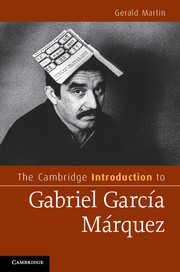Book contents
- Frontmatter
- Contents
- Introduction
- Chapter 1 The life and work in historical context
- Chapter 2 Early short stories, journalism and a first (modernist) novel, Leaf Storm (1947–1955)
- Chapter 3 The neorealist turn
- Chapter 4 One Hundred Years of Solitude (1967)
- Chapter 5 The Autumn of the Patriarch (1975)
- Chapter 6 Chronicle of a Death Foretold (1981)
- Chapter 7 Love in the Time of Cholera (1985)
- Chapter 8 More about power
- Chapter 9 More about love
- Chapter 10 Memoirs
- Conclusion
- Notes
- Further reading
- Index
Chapter 6 - Chronicle of a Death Foretold (1981)
postmodernism and Hispanic literature
Published online by Cambridge University Press: 05 June 2012
- Frontmatter
- Contents
- Introduction
- Chapter 1 The life and work in historical context
- Chapter 2 Early short stories, journalism and a first (modernist) novel, Leaf Storm (1947–1955)
- Chapter 3 The neorealist turn
- Chapter 4 One Hundred Years of Solitude (1967)
- Chapter 5 The Autumn of the Patriarch (1975)
- Chapter 6 Chronicle of a Death Foretold (1981)
- Chapter 7 Love in the Time of Cholera (1985)
- Chapter 8 More about power
- Chapter 9 More about love
- Chapter 10 Memoirs
- Conclusion
- Notes
- Further reading
- Index
Summary
The Autumn of the Patriarch was published in 1975, to mixed reviews, though García Márquez claimed to be confident that it was his most important work, even if the critics were slow to appreciate it. Now he was not sure what to do. After the publication of One Hundred Years of Solitude he had known that The Autumn of the Patriarch was his next project even if, in the event, it took him much longer to write and caused him much anguish in the writing. But now his natural trajectory seemed to have been completed and he was not at all sure what to do next.
Militant journalism: Alternativa, Bogotá (1974–1980)
What he did know was that he had sorely missed journalism since writing his last articles in 1960–61, and now that he was a widely known Latin American celebrity he wanted to ‘use his fame’ to intervene in the debates about Latin American politics. He was still an admirer of the Cuban Revolution of Fidel Castro – whom he would soon befriend – but he was horrified by what was happening in the rest of Latin America in the early 1970s. He confessed that the military overthrow of Salvador Allende’s democratic socialist regime in Chile in September 1973 was a ‘personal catastrophe’ for him and he declared, somewhat recklessly, that he would not publish another novel until the military junta now ruling Chile had been overthrown. In order to return to journalism and influence events, he helped to found a left-wing magazine called Alternativa (1974–80) in Bogotá and, while spending most of his time in Europe and, in particular, in his new home in Mexico City, he devoted himself conscientiously to campaigning journalism and other political activities over the next six years.
- Type
- Chapter
- Information
- The Cambridge Introduction to Gabriel García Márquez , pp. 75 - 89Publisher: Cambridge University PressPrint publication year: 2012



